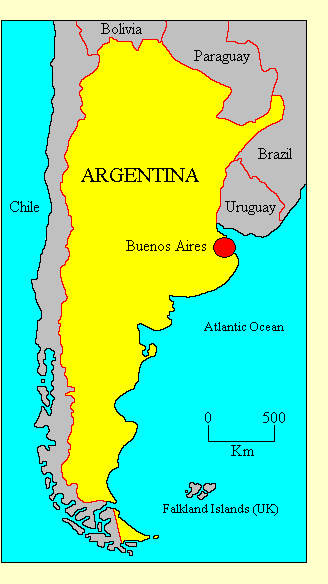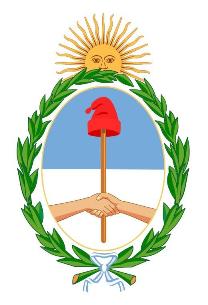

REPUBLIC OF ARGENTINA
Official name: Republica de Argentina (Republic of Argentina)
• Location: South America
• International organisations: Organisation of American States, United Nations, World Trade Organisation
• Borders: Bolivia, Brazil, Chile, Paraguay, Uruguay
• Coastline: South Atlantic Ocean
• Land area: 2,766,890 Km2
• Population: 40,800,000
• Annual GDP (PPP) per capita: US$14,700 (2009 CIA estimate). World ranking: 57
• Ethnicity: Nearly all Argentines are of European descent, the large majority
Spanish but including many of Italian, German, British and other.
• Languages: Spanish is the official language and is univerally used.
• Religion: Over 90% are at least nominally Catholic Christians, but
Argentina is the most secularised country in South America. There are small
Protestant and Jewish minorities.
• Form of government: Presidential democratic republic. Argentina is divided into
23 Provinces and one Federal District.
• Capital: Buenos Aires
• Constitution: The
Consitution of the Argentine Nation dates from 1 May 1853, but has been revised many
times, most recently in 1994.
• Head of state: The President, elected by direct universal suffrage for a four-year
term.
• Head of government: The President, who appoints the members of the Cabinet.
• Legislature: Argentina has a bicameral legislature, the
National Congress (Congreso Nacional).
The Chamber of Deputies of the Nation (Camara de Diputados de la Nacion) has 257
members, elected for four-year terms by proportional representation, with half the
members facing re-election every two years. The Senate of the Nation (Senado de la
Nacion) has 72 members, elected for six-year terms, three from each province.
• Electoral authority: The
National Election Chamber administers national elections.
• Freedom House 2011 rating: Political Rights 2, Civil Liberties 2
• Transparency International Corruption Index: 29% (105 of 178 countries rated)
• Reporters Without Borders Press Freedom 2010 Index: 83.4% (55 of 178 countries rated)
• Heritage Foundation Economic Freedom 2010 Index: 51.7% (138 of 178 countries rated)
Political history

The territory which is now Argentina was brought under Spanish control in the
mid 16th century. In 1776 Buenos Aires became capital of the Viceroyalty of La Plata.
In 1810 patriots in Buenos Aires declared independence, and the Spanish were finally
evicted in 1816. At first called the United Provinces of the Rio de la Plata,
Argentina did not acquire its present boundaries and a stable government until 1862.
The later 19th century saw Argentina become one of the wealthiest countries in
the world through the export of beef, and during this period Argentina enjoyed
constitutional government, with
presidents being chosen by an indirectly elected Electoral College. This system broke
down in the 1930s under the impact of the Depression, and there was a series of coups
and outbreaks of violence, culminating in the rise to power of Juan Domingo Peron in
1946.
Peron established a populist or semi-fascist regime, and Peronism
became a permanent part of Argentine politics. Peron was overthrown in a coup in 1955,
but there was no return to stable government. A further coup in 1966 established a
military regime which held power until 1973, when Peron was permitted to return. But
his death in 1974 led to another coup, and the military held power
until the debacle of the Falklands war in 1982.

Argentina's defeat by Britain in the Falklands led to the disgrace of the
military and a permanent return to civilian government. The Peronist tradition of
conservative populism is
represented by the Justicialist Party, which has
provided Argentina's most successful recent president, Carlos Saul Menem. The party now campaigns under
the title Front for Victory. The
Radical Civic Union (UCR) stands for civic liberalism and
financial orthodoxy. It has been challenged recently by the Civic Coalition.
The largest left-wing party, FREPASO, disintegrated after 2000 and the left now has little
influence.
Although democratic government and the rule of law now seem secure in
Argentina, neither major party has been able to deal with the country's chronic
economic weakness, stemming from the loss of its traditional export markets in Europe.
In 2001 there was a prolonged crisis which forced the resignation of UCR President Fernando de la Rua. In April 2003 the Peronist Nestor Kirchner was elected
President after Menem abandoned his attempt to return to power. Kirchner stablised the political and economic situation and
was succeeded in 2007 by his wife,
Cristina Fernandez de Kirchner. At the 2009
congressional elections, however, the Peronists lost control of both houses of the Congress.
Freedom House's 2011 report on Argentina says:
"Argentina is an electoral democracy... Nestor Kirchner's government initially made anticorruption efforts a central theme, establishing
the public's right to information and other transparency guarantees. However, subsequent corruption scandals revealed the degree to which
entrenched corruption plagues Argentine society, tainting his and his wife's administrations... Freedom of expression is guaranteed by law
[but] Cristina Fernandez de Kirchner's government has consistently limited press freedom in practice...
The rights to freedom of assembly and association are generally respected... While Nestor Kirchner appointed magistrates of professional
quality, the tenure of scores of incompetent and corrupt judges remains a serious problem. Police misconduct, including torture and
brutality of suspects in police custody, is endemic."
Updated October 2011
|


